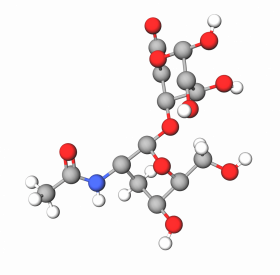Hyaluronic acid (HA) is a polymer that naturally fills the space between collagen, elastin fibers, and skin cells. It is mainly responsible for the skin's water-binding ability and visco-elastic characteristics.
Macromolecular hyaluronic acid consists of 1,500 KD and larger molecules, which cannot penetrate the skin barrier. With high relative molecular mass, hyaluronic acid consists of approximately 1,000 to 10,000 disaccharides (glucuronic acid and N-acetylglucosamine) unit long chains without branches.
The high viscosity of macromolecular HA with very pronounced hydrophilic characteristics allows for making a highly viscous solution with water that, even in low concentrations, exhibits outstanding spreading and lubricating properties. As water evaporates, it fuses with the skin’s keratin to create a film that hydrates, reduces transdermal moisture loss, and improves elasticity. In addition, Macromolecular hyaluronic acid has natural anti-inflammatory properties.
It is an ideal skincare ingredient that helps maintain the skin's suppleness, smoothness, and youthfulness while replenishing moisture contents and natural protective mechanisms.